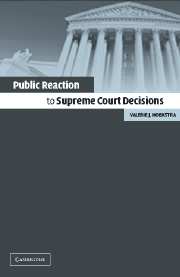Book contents
- Frontmatter
- Contents
- List of Figures
- List of Tables
- Acknowledgments
- 1 The High-Wire Act: The Supreme Court and Public Opinion
- 2 From the Marble Temple to Main Street: Placing the Cases in Political and Legal Context
- 3 Media Attention and Public Awareness
- 4 Changing Hearts and Minds? Examining the Legitimation Hypothesis
- 5 Public Support for the Supreme Court
- 6 Conclusion: Balancing Independence and Support
- Appendix A Sampling
- Appendix B Survey Instruments Included in the Analysis
- Appendix C Local and National Media Coverage of a Sample of Supreme Court Cases: 1996–97 Term
- Appendix D Statistical Issues with the Analysis of Panel Data
- References
- Index
4 - Changing Hearts and Minds? Examining the Legitimation Hypothesis
Published online by Cambridge University Press: 02 September 2009
- Frontmatter
- Contents
- List of Figures
- List of Tables
- Acknowledgments
- 1 The High-Wire Act: The Supreme Court and Public Opinion
- 2 From the Marble Temple to Main Street: Placing the Cases in Political and Legal Context
- 3 Media Attention and Public Awareness
- 4 Changing Hearts and Minds? Examining the Legitimation Hypothesis
- 5 Public Support for the Supreme Court
- 6 Conclusion: Balancing Independence and Support
- Appendix A Sampling
- Appendix B Survey Instruments Included in the Analysis
- Appendix C Local and National Media Coverage of a Sample of Supreme Court Cases: 1996–97 Term
- Appendix D Statistical Issues with the Analysis of Panel Data
- References
- Index
Summary
The Court cannot buy support for its decisions by spending money and, except to a minor degree, it cannot independently coerce obedience to its decrees. The Court's power lies, rather, in its legitimacy, a product of substance and perception that shows itself in the people's acceptance of the Judiciary as fit to determine what the Nation's law means and to declare what it demands.
– Justice Sandra Day O'ConnorINTRODUCTION
Knowledge of a Court case is a prerequisite for it to have an effect on public opinion; but, the apparent lack of public awareness has been the single most difficult obstacle in real-world studies of the Court's persuasive appeal. However, the previous chapter revealed that extensive local media coverage of these four local cases resulted in intense public interest and knowledge of the cases. While there were differences between these cases, in general, there was substantial support for the hypotheses about media attention, public awareness, and perceptions of importance.
Coverage of the Monroe case was incredibly extensive and produced high levels of awareness across both geographic samples. In the Center Moriches case, media coverage was moderately high, certainly higher than national media interest, and this local coverage produced the highest levels of awareness across all four cases. As with the Monroe case, knowledge was nearly equal between the samples, especially after controlling for other factors, such as interest in politics and level of education.
In the Oregon spotted owl case, media coverage was also high, especially compared with national coverage.
- Type
- Chapter
- Information
- Public Reaction to Supreme Court Decisions , pp. 87 - 114Publisher: Cambridge University PressPrint publication year: 2003

